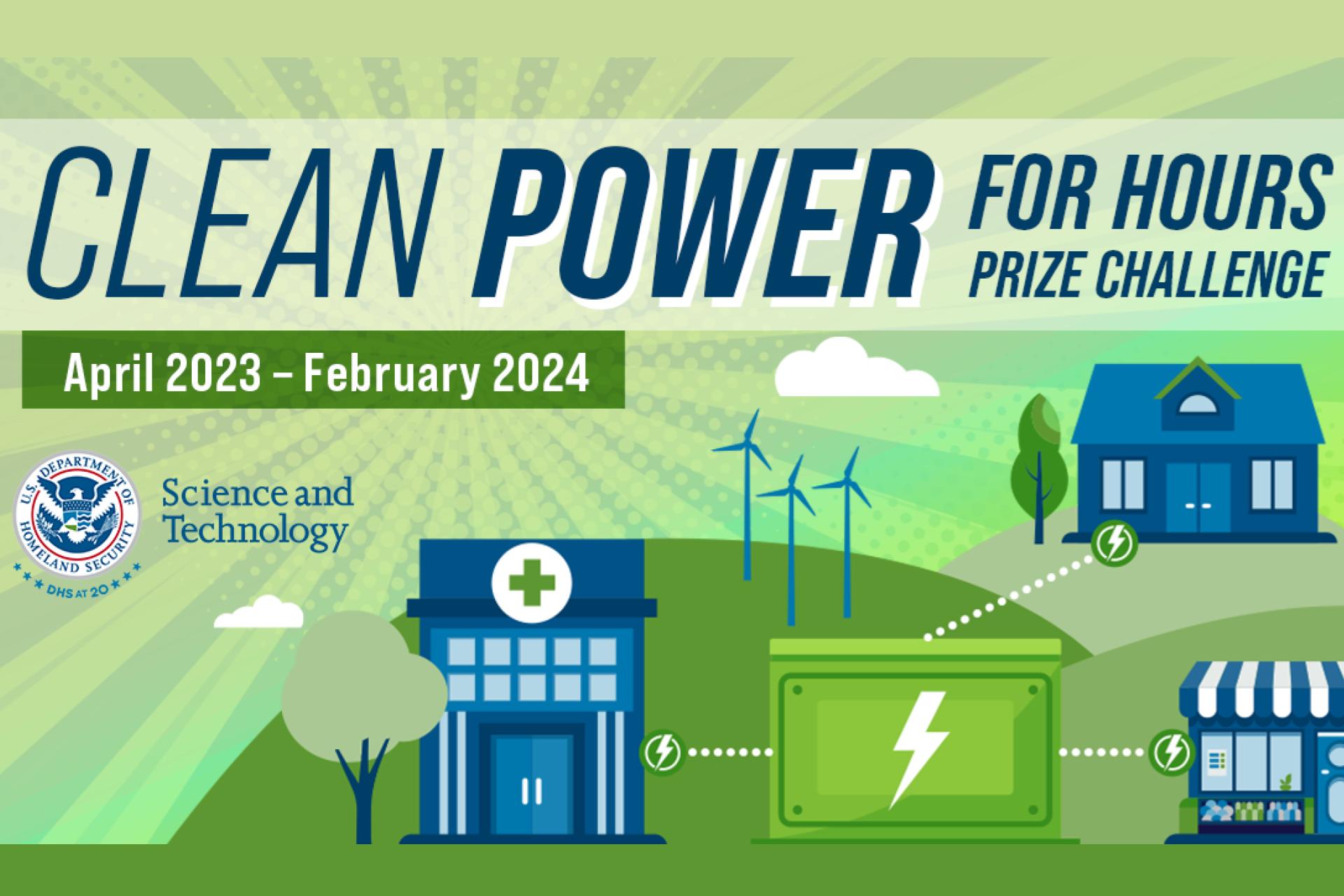HLS.Today – S&T’s “Clean Power for Hours Challenge” is looking for clean ways to keep lifeline community services going when power goes out. The Department of Homeland Security (DHS) announced a new prize competition focusing on clean energy sources to keep essential services functioning during power outages, highlighting the Department’s efforts to address risks posed by climate change. The Science and Technology Directorate (S&T) administers prize competitions to crowdsource innovation and harness the creativity of the American public to solve critical homeland security challenges.
“The speed with which technology is advancing provides opportunities to increase our effectiveness through innovation. Harnessing the benefits offered by these advances is particularly important to our work during emergencies when it is imperative that our critical infrastructure remains functional and can serve our communities,” said Secretary of Homeland Security Alejandro N. Mayorkas. “The Clean Power for Hours Challenge opens a door for the creative and innovative minds of our nation to submit clean energy solutions that will effectively support communities in times of need.”
The Clean Power for Hours Challenge seeks innovative back-up power solutions that will help critical facilities such as fire stations, hospitals, and shelters, continue to operate during electrical outages. Winning solutions should be environmentally friendly, affordable, easy-to-use, and provide back-up power generation for critical facilities that serve communities across the United States. This is particularly vital to National Critical Functions (NCF) that support essential community lifelines.
“It is a priority for us to ensure the country can mitigate the many risks that come with climate change,” said Dr. Dimitri Kusnezov, DHS Under Secretary for Science and Technology. “More frequent and severe weather events will increase the likelihood of power outages all over the country. Harnessing grassroots innovators to help us address climate resilience in this challenge can further enhance our mission to protect everyday Americans.”
The Challenge is open to U.S. citizens, permanent legal residents and businesses incorporated in and maintain a primary place of business in the United States. Visit Challenge.gov for the full rules and directions on how to enter. All submissions are due by August 8, 2023.
The Challenge will take place in two stages. In the first stage, contestants will provide a written or video submission describing how their solution meets the judging criteria. Up to 15 finalists will receive $10,000 and advance to stage two. In the second stage, finalists will compete with their advanced solution for the grand prize of $400,000, a runner-up prize of $200,000, and up to two honorable mention prizes of $50,000.
DHS established the first-ever Climate Change Action Group (CCAG), which is comprised of senior officials from across the Department, to focus on promoting resilience and addressing multiple risks that include flooding, extreme heat, drought and wildfires. The CCAG oversees the implementation of the Climate Action Plan and guides DHS’ approach to managing the climate crisis.
Climate Change Action Group
The DHS Climate Change Action Group is a coordinating body comprised of the Department’s senior leadership that drives urgent action to address the climate crisis and reports directly to the Secretary. Announced by Secretary Mayorkas on April 22, 2021, the Climate Change Action Group will unite, refocus, and elevate the Department’s cross-functional efforts to tackle the climate crisis.
The group will drive action across the following six priorities:
Analyzing, on an ongoing basis, the impacts of climate change on DHS missions, assets, and personnel;
Adapting DHS operations, assets, and missions to account for the climate crisis via risk- based strategies;
Coordinating DHS-wide sustainability operations to mitigate additional harm;
Recommending specific, concrete steps to reduce greenhouse gas emissions;
Recommending specific, concrete steps to promote resilience and adaptation to reduce the multiple risks posed by the climate crisis; and,
Recommending organizational and resource realignments as necessary to support the Department’s activities to address the climate crisis.
Every DHS Component and office will work together to tackle the challenges posed by climate change, which affect our operations, plans, business processes, programs, and strategies. Just as importantly, our engagements with partners across the homeland security enterprise will also reflect the seriousness with which we approach the risks posed by climate change.
The climate crisis poses a significant threat to both DHS operations and the American people. It is vital for the Department to provide leadership and take proactive measures to minimize its environmental impact across the United States and globally.
What We Are Looking for:
The Department of Homeland Security (DHS) is looking for innovative back-up power solutions that will help critical facilities continue to operate during electrical outages. Winning solutions will be affordable, easy-to-use, and environmentally friendly power sources that can provide on-site power generation for critical facilities that provide essential services to communities across the United States. This Challenge is seeking to identify and catalyze existing cutting-edge technologies with a Technical Readiness Level (TRL) of 6 or higher that can be used to continue essential facility operations in an event of a power failure or disruption lasting more than 36-hours. TRL refers to the method for determining the maturity of technology.
This is particularly important to National Critical Facilities (NCF) that support essential community lifelines services (basic needs like emergency services, urgent healthcare, and food/water).
These technologies also should be capable of working with on-site renewable power generation including alternative energy sources such as solar Photovoltaics (PV) arrays and small-scale wind power or operating as part of a virtual power plant or similar concept and be able to coordinate with other distributed energy resources.
This Challenge is part of the DHS effort to implement a proactive approach to climate change adaptation and resilience. This is the second in a series of DHS prize competitions to address hazards posed by climate change. This Challenge will support DHS’s mission on climate change resilience and adaptation, and work with the energy sector and other critical infrastructure owners and operators to find solutions for back-up power generation during a disaster.
The Reason Why:
Most Americans may not think of critical infrastructure on a regular basis—that is, until it is not working. A power outage during a storm or limited access to healthcare facilities after a ransomware attack are real life reminders of the role critical infrastructure plays in daily lives. Keeping the nation’s critical infrastructure and essential services safe and secure is important to our national security, economy, and overall way of life. Critical infrastructure spans everything from telecommunications and chemical facilities to local healthcare providers and financial institutions and much more. Critical infrastructure is the backbone of many essential services, and all infrastructure is dependent on power to function well. Critical infrastructure and its supporting systems keep our country and our economy running.
Much goes into securing our critical infrastructure and understanding the impacts of climate change is a major consideration. One of the key components is ensuring that anchor institutions, or essential community service provider facilities continue to function even during a power disruption. Promoting national resilience against the many threats associated with climate change is a DHS priority. Climate change will increase the likelihood of power outages nationwide. Depending on what type of facilities experience a power outage, the implications of a power failure can endanger lives and safety of Americans. Critical facilities that support community essential services often rely solely on electricity for power and lack adequate on-site power generation and energy storage to operate during a power outage.
Fossil fuel-powered emergency (back-up) generators are the most commonly used solutions to supply backup power during facility power disruptions. Most fossil fuel-powered back-up generators run on gas, diesel, natural gas, or propane, all of which have debilitating effects on the climate, producing substantial greenhouse gas (GHG) emissions, environmental and noise pollution that impacts community public safety, health, and environmental security, and have fuel delivery and storage requirements that pose additional safety concerns, especially under extreme weather conditions. Battery-powered storage has emerged as an alternative to fossil fuel generators offering a variety of societal benefits such as reducing utility bill payments, storing energy from solar panels for later use, and providing back-up power during limited power disruptions. Significant issues exist with battery solutions such as supply-chain and manufacturing risks, reliability, cost, and end-of life considerations that may impact a stakeholders’ willingness or ability to deploy them, and energy storage capacity limitations (12-24 hours of backup power).
This also includes:
- Reliance on foreign and volatile supply-chains for extraction of materials and manufacturing components and systems
- Safety and reliability concerns stemming from fire and explosion risks associated with these systems
- Stationary, energy storage systems that compete with rapidly growing electrified transportation sector for battery materials and components such as materials used in cells
- Emissions and waste produced over the lifetime of systems spanning from materials extraction through end-of-life disposal
- Non-ideal solution long duration storage (10+ hours) due to high cost or limited technical capacity with existing consumer battery-powered backup solutions.
These issues are especially acute for owners and operators that are responsible for providing and maintaining critical societal services. In addition, the U.S. will benefit from clean energy storage solutions that can overcome key challenges such as sourcing minerals and materials that are commonly available in the United States (U.S.) developing highly reliable systems that minimize safety concerns and align with decarbonization and emission reduction goals.
Important Dates to Keep in Mind:
Open to Submissions: You can enter the Clean Power for Hours Challenge starting Friday, April 21, 2023 at 3:00 p.m. EDT (04/21/2023 03:00 PM EDT)
Close to Submissions: You have until Tuesday, August 8, 2023 by 8:00 p.m. EDT (08/08/2023 08:00 PM EDT)
Finalists: We will announce the Finalists in August 2023
Prize Winners: We will announce Prize Winners in February 2024
(Dates are subject to change. We will announce changes on this website and through social media)
Prize total:
$850,000
Prize phases: This Challenge is in two stages.
Finalists
In Stage 1 the judges will choose up to fifteen Stage 1 Finalists to advance to Stage 2. Each Finalist will receive $10,000. Take a look at the submission guidelines, Challenge Rules, Stage 1 judging criteria and the two possible Use Cases. If you are chosen as a Finalist, you will automatically advance to Stage 2.
Prize Winners
During Stage 2, we will hold a live demonstration of your solution and a second judging process. Afterwards, the judges will choose Prize Winners. All of the judging criteria in State 1 plus additional Stage 2 judging criteria will be considered.
We will announce:
Grand prize winner: $400,000
Runner up winner: $200,000
Up to two Honorable mentions: $50,000
Non-monetary prizes:
We also may consider winning submissions for future opportunities such as assistance with mentors to refine or advanced proposed solutions; connections to technology accelerators or other innovation development programs; connections to existing developers and/or manufacturers; and/or, opportunities to speak at conferences with broader security audiences.
HLS.Today
Source HLS.Today: DHS.GOV








